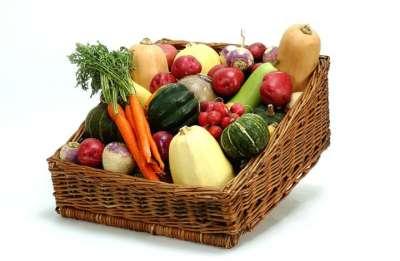No matter how or why vegetarians choose to alter their daily diets, they must be sure of one thing -- that they are still receiving the vitamins and nutrients their body needs.
Just because a person adopts a vegetarian diet doesn't mean it's a healthy one. It takes time and effort by each individual to make sure the diet they adopted is complete for their lifestyle.
To eat meat or not to eat meat is not the only question people may ponder when considering a vegetarian diet. In fact, there are a wide variety of vegetarians.
Someone saying they're vegetarian can mean a number of things. There's no simple label that applies to everyone.
The "traditional" vegetarian is someone who avoids meat products, including red meat, poultry and fish. Vegetarian diets that also include eggs are called ovo-vegetarian, and those that include both dairy products and eggs are called lacto-ovo vegetarian.
A vegan diet is one devoid of any food items derived from animals, including dairy, eggs and, for some, honey. A pesco-vegetarian will eat fish, while a semi-vegetarian avoids only red meat products. There are also people who adopt a fruitarian diet -- one that only includes sweet and vegetable fruits.
Within these categories, a number of varieties exist as well. Some people may not always eat vegetarian or choose to eat a little of some of the foods excluded from that diet.
The more restrictive a person's diet is, the more careful they need to be to make sure it's nutritionally adequate.
The reasons people choose to be vegetarian are as varied as the diets themselves. It may be for economic and ecological reasons (that the world cannot support a meat-based diet for the entire population) or for ethical reasons (that animals should not be killed for human consumption).
People may also choose to avoid certain foods due to health problems such as allergies, hypertension and lactose intolerance. And those wishing to maintain a healthy lifestyle through a low-fat diet may also opt for vegetarianism. Other driving factors for choosing a vegetarian diet may include religious beliefs.
A lot of people think they feel better when they eat vegetarian. A healthy diet may be associated with a healthy lifestyle, including exercise and avoidance of health risks such as smoking.
Making sure a vegetarian diet is complete in vitamins and nutrients is especially important for children and pregnant women. In such cases, vitamin supplements are recommended, especially for those avoiding dairy products. These should include vitamin B-12, vitamin D, calcium, iron and zinc.
If a diet excludes dairy products, it's important to take calcium supplements. Vegetarians may also have difficulties getting an adequate amount of iron from plant sources alone. And when it comes to protein, vegetarians can combine vegetable protein sources -- such as seeds and dairy products, or grains and legumes to get a protein source nutritionally equivalent to that of animal-based products.
